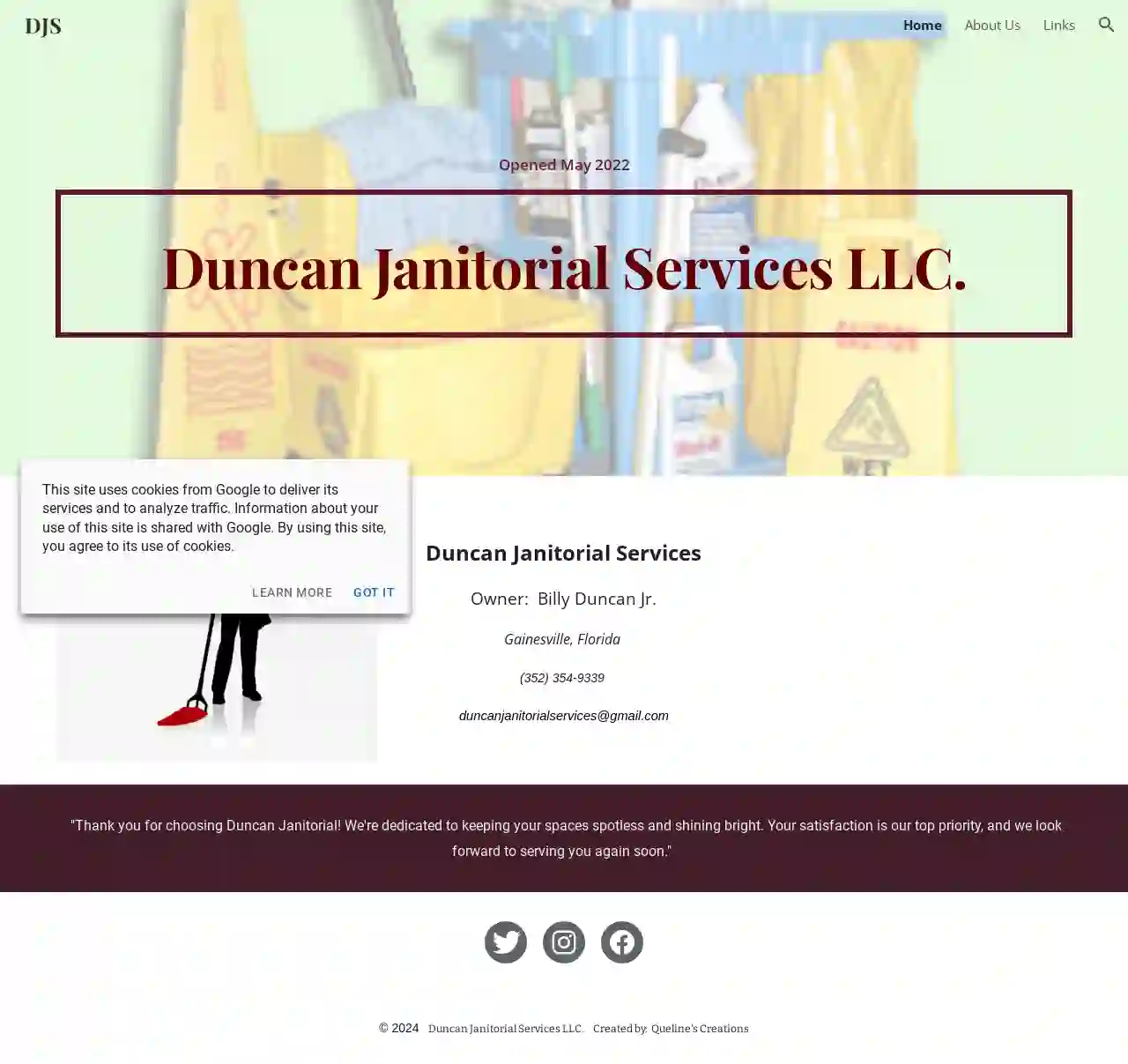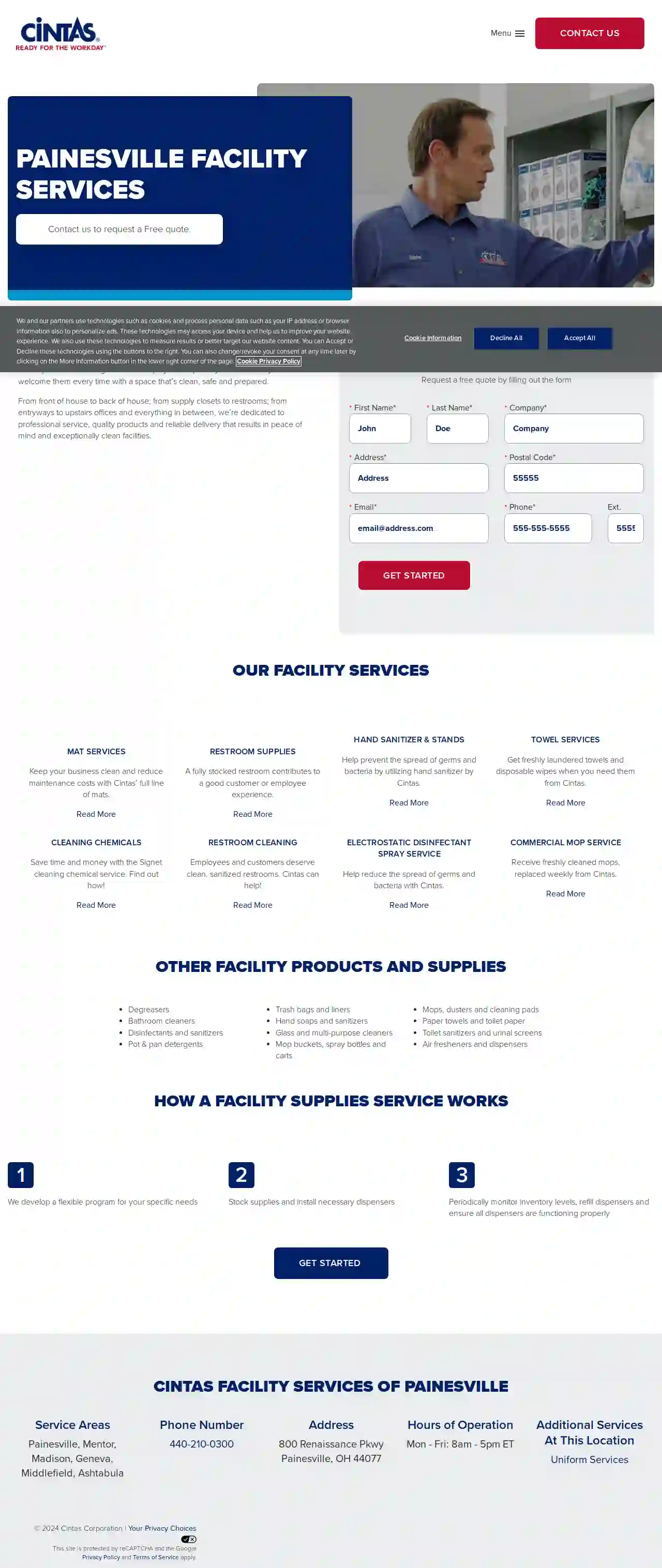Cleaning Services Tifton
Find the best Apartment Cleaning in Tifton
Receive multiple Cleaning Companies quotes for your project today! Compare profiles, reviews, accreditations, portfolio, etc... and choose the best offer.
Service Needed
City or Town

CleanNet of Atlanta
53 reviewsAtlanta, US- Services
- Why Us?
Get Quote
Eliteness Cleaning Maid Service
3.935 reviewsAtlanta, US- Services
- Why Us?
Get Quote- Sw
Sweeping B LLC
4.839 reviewsMacon, US- Services
- Why Us?
Get Quote 
Griffith Commercial Cleaning
57 reviewsAtlanta, US- Services
- Why Us?
Get Quote
Georgia Pro Cleaners, LLC
51 reviewsAtlanta, US- Services
- Why Us?
Get Quote
Enviro-Master of Savannah
5149 reviewsSavannah, US- Services
- Why Us?
Get Quote- 1s
1st Choice All Purpose Cleaning, LLC
56 reviewsGainesville, US- Services
- Why Us?
Get Quote - M.
M.H.Commercial Cleaning Services
55 reviewsSavannah, US- Services
- Why Us?
Get Quote 
Duncan Janitorial Services, LLC
51 reviewsGainesville, US- Services
- Why Us?
Get Quote
Cintas Facility Services
4.329 reviewsColumbus, US- Services
- Why Us?
Get Quote
Over 60,241+ Janitorial Companies on our platform
Our janitorial services operate in Tifton & surrounding areas!
CleaningMatch has curated and vetted Top Janitorial Services in Tifton. Find the most trustworthy business today.
Frequently Asked Questions About Cleaning Services
Find answers to common questions about cleaning services and hiring cleaning companies in the USA.
- Ventilation: Improve ventilation by opening windows, turning on the exhaust fan, and using a dehumidifier to reduce moisture levels.
- Bleach Solution: Mix one cup of bleach with one gallon of water. Wear gloves and eye protection when handling bleach. Apply the solution to the affected area, let it sit for 10-15 minutes, then scrub with a brush and rinse thoroughly.
- Vinegar Solution: For a milder alternative, mix equal parts water and vinegar. Apply to the moldy area, let it sit for an hour, then scrub and rinse.
- Baking Soda Paste: Make a paste of baking soda and water, apply to the moldy area, let it dry, then scrub and rinse. Baking soda helps remove stains and deodorize.
- Commercial Mold and Mildew Remover: Use a commercial mold and mildew remover according to the product instructions.
- Check Fabric Care Label: Always check the upholstery care label for cleaning instructions specific to the fabric. Some fabrics may require professional cleaning.
- Vacuum: Vacuum the upholstery thoroughly to remove dust and loose debris. Use a brush attachment for crevices and seams.
- Spot Cleaning: For stains, blot with a clean cloth or sponge. Avoid rubbing, as it can spread the stain. Use a mild upholstery cleaner or a homemade solution of water and mild dish soap.
- Upholstery Cleaning Machine: If the fabric is suitable for wet cleaning, you can use an upholstery cleaning machine. Follow the machine's instructions carefully and test a small, hidden area first.
- Professional Upholstery Cleaning: For delicate fabrics, deep cleaning, or stubborn stains, consider hiring a professional upholstery cleaning service. They have specialized knowledge and equipment to clean upholstery safely and effectively.
- Weekly: Suitable for busy households with children or pets, ensuring a consistently clean and healthy environment.
- Bi-weekly: A good option for smaller households or those who maintain a relatively clean home.
- Monthly: May be sufficient for individuals or couples who live a minimalist lifestyle.
- Quarterly or Annually: Can be suitable for deep cleaning or seasonal cleaning tasks.
- Dishes: Load the dishwasher or wash dishes by hand.
- Sink: Clean the sink with a sponge or cloth and dish soap. Pay attention to the faucet and drain. You can also use a baking soda paste to remove stubborn stains.
- Countertops: Wipe down countertops with a disinfectant cleaner or all-purpose cleaner.
- Stovetop: Clean the stovetop with a degreaser or stovetop cleaner. Remove burner grates and wash them separately if needed.
- Oven: Clean the oven according to the manufacturer's instructions. You can use a self-cleaning function or a commercial oven cleaner.
- Microwave: Clean the microwave interior with a damp cloth or sponge. For stuck-on food, heat a bowl of water with lemon juice in the microwave for a few minutes to loosen debris.
- Refrigerator: Wipe down the refrigerator shelves and drawers with a damp cloth or sponge. Remove any expired food and clean spills promptly.
- Floors: Sweep or vacuum the floor, then mop with a floor cleaner suitable for your kitchen floor type.
- Trash: Empty the trash can and recycling bin.
How do I remove mold and mildew from my bathroom?
Mold and mildew can grow in damp areas like bathrooms, posing health risks and aesthetic concerns. Here's how to remove them:
Always test any cleaning solution on a small, inconspicuous area first. After cleaning, take steps to prevent future mold growth by addressing moisture issues, such as fixing leaks and improving ventilation.
Always test any cleaning solution on a small, inconspicuous area first. After cleaning, take steps to prevent future mold growth by addressing moisture issues, such as fixing leaks and improving ventilation.
How do I clean upholstery without damaging the fabric?
Cleaning upholstery requires care to avoid damaging delicate fabrics. Follow these steps:
Always test any cleaning solution on a small, inconspicuous area first to avoid discoloration or damage.
Always test any cleaning solution on a small, inconspicuous area first to avoid discoloration or damage.
How often should I have my house cleaned?
The frequency of house cleaning depends on factors like your lifestyle, the size of your house, and your personal preferences. Here's a general guideline:
You can adjust the frequency based on your needs and budget. Some people opt for weekly cleaning for high-traffic areas like kitchens and bathrooms and bi-weekly cleaning for the rest of the house.
You can adjust the frequency based on your needs and budget. Some people opt for weekly cleaning for high-traffic areas like kitchens and bathrooms and bi-weekly cleaning for the rest of the house.
What is the most efficient way to clean a kitchen?
A clean kitchen is essential for food safety and a pleasant cooking experience. Here's an efficient kitchen cleaning process:
Regularly cleaning your kitchen helps maintain a hygienic and organized space for cooking and dining.
Regularly cleaning your kitchen helps maintain a hygienic and organized space for cooking and dining.
How do I remove mold and mildew from my bathroom?
Mold and mildew can grow in damp areas like bathrooms, posing health risks and aesthetic concerns. Here's how to remove them:
Always test any cleaning solution on a small, inconspicuous area first. After cleaning, take steps to prevent future mold growth by addressing moisture issues, such as fixing leaks and improving ventilation.
- Ventilation: Improve ventilation by opening windows, turning on the exhaust fan, and using a dehumidifier to reduce moisture levels.
- Bleach Solution: Mix one cup of bleach with one gallon of water. Wear gloves and eye protection when handling bleach. Apply the solution to the affected area, let it sit for 10-15 minutes, then scrub with a brush and rinse thoroughly.
- Vinegar Solution: For a milder alternative, mix equal parts water and vinegar. Apply to the moldy area, let it sit for an hour, then scrub and rinse.
- Baking Soda Paste: Make a paste of baking soda and water, apply to the moldy area, let it dry, then scrub and rinse. Baking soda helps remove stains and deodorize.
- Commercial Mold and Mildew Remover: Use a commercial mold and mildew remover according to the product instructions.
Always test any cleaning solution on a small, inconspicuous area first. After cleaning, take steps to prevent future mold growth by addressing moisture issues, such as fixing leaks and improving ventilation.
How do I clean upholstery without damaging the fabric?
Cleaning upholstery requires care to avoid damaging delicate fabrics. Follow these steps:
Always test any cleaning solution on a small, inconspicuous area first to avoid discoloration or damage.
- Check Fabric Care Label: Always check the upholstery care label for cleaning instructions specific to the fabric. Some fabrics may require professional cleaning.
- Vacuum: Vacuum the upholstery thoroughly to remove dust and loose debris. Use a brush attachment for crevices and seams.
- Spot Cleaning: For stains, blot with a clean cloth or sponge. Avoid rubbing, as it can spread the stain. Use a mild upholstery cleaner or a homemade solution of water and mild dish soap.
- Upholstery Cleaning Machine: If the fabric is suitable for wet cleaning, you can use an upholstery cleaning machine. Follow the machine's instructions carefully and test a small, hidden area first.
- Professional Upholstery Cleaning: For delicate fabrics, deep cleaning, or stubborn stains, consider hiring a professional upholstery cleaning service. They have specialized knowledge and equipment to clean upholstery safely and effectively.
Always test any cleaning solution on a small, inconspicuous area first to avoid discoloration or damage.
How often should I have my house cleaned?
The frequency of house cleaning depends on factors like your lifestyle, the size of your house, and your personal preferences. Here's a general guideline:
You can adjust the frequency based on your needs and budget. Some people opt for weekly cleaning for high-traffic areas like kitchens and bathrooms and bi-weekly cleaning for the rest of the house.
- Weekly: Suitable for busy households with children or pets, ensuring a consistently clean and healthy environment.
- Bi-weekly: A good option for smaller households or those who maintain a relatively clean home.
- Monthly: May be sufficient for individuals or couples who live a minimalist lifestyle.
- Quarterly or Annually: Can be suitable for deep cleaning or seasonal cleaning tasks.
You can adjust the frequency based on your needs and budget. Some people opt for weekly cleaning for high-traffic areas like kitchens and bathrooms and bi-weekly cleaning for the rest of the house.
What is the most efficient way to clean a kitchen?
A clean kitchen is essential for food safety and a pleasant cooking experience. Here's an efficient kitchen cleaning process:
Regularly cleaning your kitchen helps maintain a hygienic and organized space for cooking and dining.
- Dishes: Load the dishwasher or wash dishes by hand.
- Sink: Clean the sink with a sponge or cloth and dish soap. Pay attention to the faucet and drain. You can also use a baking soda paste to remove stubborn stains.
- Countertops: Wipe down countertops with a disinfectant cleaner or all-purpose cleaner.
- Stovetop: Clean the stovetop with a degreaser or stovetop cleaner. Remove burner grates and wash them separately if needed.
- Oven: Clean the oven according to the manufacturer's instructions. You can use a self-cleaning function or a commercial oven cleaner.
- Microwave: Clean the microwave interior with a damp cloth or sponge. For stuck-on food, heat a bowl of water with lemon juice in the microwave for a few minutes to loosen debris.
- Refrigerator: Wipe down the refrigerator shelves and drawers with a damp cloth or sponge. Remove any expired food and clean spills promptly.
- Floors: Sweep or vacuum the floor, then mop with a floor cleaner suitable for your kitchen floor type.
- Trash: Empty the trash can and recycling bin.
Regularly cleaning your kitchen helps maintain a hygienic and organized space for cooking and dining.